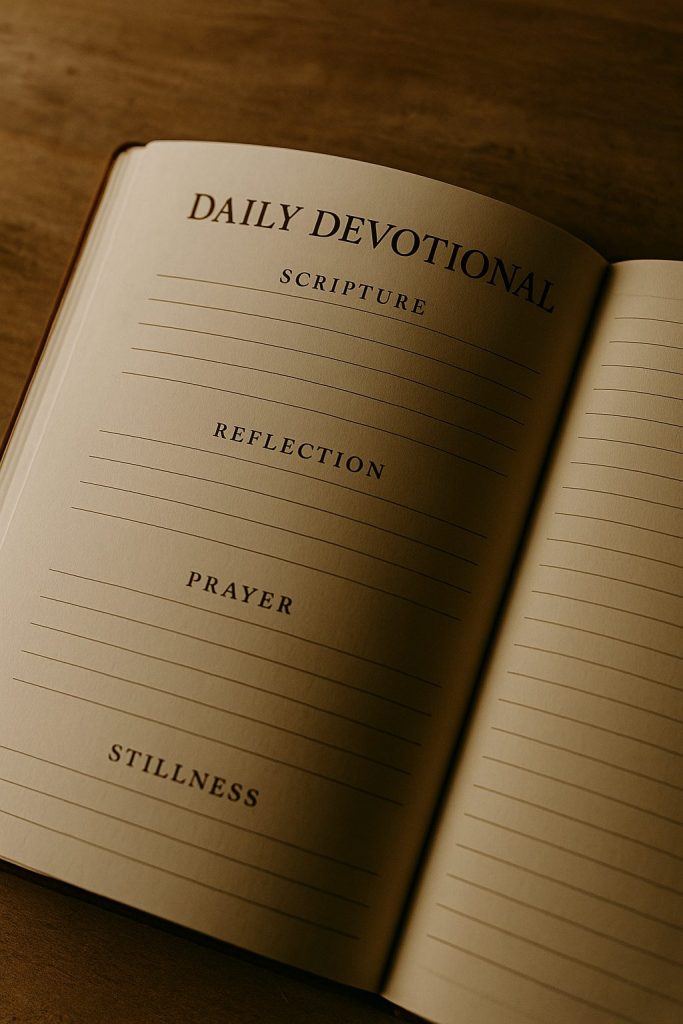God And Anxiety Daily Devotional Readings: Calm, Tools, Hope
Estimated reading time: 7 minutes
Introduction
If you are searching for god and anxiety daily devotional readings, you likely want a reusable page you can pray through daily. This guide gives you that page and shows how Scripture, calm breathing, and wise care work together. Anxiety does not disqualify you from a vibrant walk with Jesus; rather, it can become a doorway to deeper trust. The Bible invites you to bring every worry to the Lord (Philippians 4:6–7), and modern research explains how prayer and attention shape the brain toward peace. Because body and soul are connected, you will see spiritual truth paired with practical steps.
First, remember that many believers struggle with clinical or situational anxiety. A church‑oriented overview notes how common mental health challenges are and encourages seeking help when needed (see this summary). Similarly, one devotional writer emphasizes that strong faith and anxiety can coexist; she invites us to stop hiding and to ask for care (read her reflection). Consequently, you can greet this moment with compassion, not shame. Moreover, this article distills a longer research PDF into one printable routine for everyday use. It is grounded in Scripture and cross‑references current science.
Below you will find a simple structure you can use each morning or night. Because habits build calm, the same flow works every day: read a short passage, reflect, pray, breathe, and take one small step. Alongside that template, the next sections explain why anxiety feels so physical and how God meets you in it. Furthermore, you will see when therapy or medicine may help and how to evaluate those options with wisdom. Finally, you will discover tools that support your practice and links to cornerstone guides that go deeper.
Biblical Perspective And Promise
Scripture names anxiety without shaming it. David wrote, “When anxiety was great within me, your consolation brought me joy” (Psalm 94:19). Therefore, you can be honest with God and still move toward peace.
Why Anxiety Happens And Where God Meets You
Why does anxiety surge even when you love God? From a biological view, your amygdala and stress hormones prepare you to face threat. However, the same alarm can misfire during everyday stress and produce racing thoughts or a tight chest. Scripture names this experience without scolding you. Accordingly, Jesus invites you not to worry because the Father cares for every detail of your life (Matthew 6:25–34). As a result, honesty before God becomes the first step toward calm.
Because God cares for your whole person, biblical wisdom pairs with practical help. As a starting point, practice casting your cares on Him (1 Peter 5:7). Meanwhile, evidence shows that prayer reduces stress and helps regulate attention and emotion (overview). Additionally, cognitive‑behavioral therapy (CBT) teaches skills that mirror the biblical call to renew the mind. For a Christian framing, see this brief on CBT’s alignment with Scripture (read more). Together, these practices interrupt rumination so you can choose trust.
Because readers requested god and anxiety daily devotional readings, we include short anchors to long‑form help on this site. For panic spikes, see our panic attack relief guide. For breath work, learn a simple practice in deep breathing exercises. For Scripture focus, bookmark core Bible verses for anxiety. Moreover, if your symptoms persist, a licensed counselor can help you tailor skills to your story (APA overview).
How Scripture And Science Work Together
Prayer redirects attention to God’s presence, and CBT reframes anxious thoughts. Consequently, body and soul begin to settle. Because practice builds pathways, even small daily repetitions matter.

A Daily Anxiety Devotional Method: Prayer And CBT
Here is a daily method that folds Scripture and CBT into god and anxiety daily devotional readings. First, choose one verse, such as Philippians 4:6–7 or Isaiah 41:10. Next, write one anxious thought and then counter it with a truthful, compassionate statement rooted in the passage. For example: “I feel overwhelmed about work; nevertheless, God promises to be with me and to guard my mind in Christ.” Then, breathe slowly for one minute and ask the Lord for help with one specific task.
This blend reflects a broader research trend called religiously integrated CBT. Therapists adapt standard tools while honoring a client’s faith commitments (method paper). Moreover, a small seminary study found that a structured Christian devotional meditation, practiced several times daily, reduced anxiety and stress about as much as biofeedback training (pilot findings). Therefore, a short, repeated routine can steadily reshape attention, emotion, and behavior.
Practice now: read the verse, pray for one minute, breathe 4‑4 rhythm for eight cycles, and pick one doable action. Additionally, write a single sentence of gratitude. Because repetition builds neural pathways, use the same template tomorrow. To deepen this daily anxiety devotional, explore focused guides on Christian meditation and deep breathing exercises.
Four Simple Daily Steps
Read a verse. Reflect in one or two sentences. Pray briefly with thanksgiving. Then breathe slowly while releasing your concerns to God.
Community, Counseling, And Medicine For Christian Anxiety Devotional Practice
God often answers prayer through people and practical means. Consequently, wise community and professional care can be part of your healing. For biblical perspective on medicine as a lawful means to relieve suffering, see this pastoral reflection (article). Therefore, if anxiety disrupts sleep, work, or relationships, consider talking with a clinician and a counselor.
A clinician may suggest psychotherapy, medication, or both. CBT helps you track triggers, challenge distorted thoughts, and rehearse courage in small steps. Meanwhile, selective serotonin reuptake inhibitors and related medicines can lower the body’s alarm so you can practice skills and prayer with a clearer head. Because each body responds differently, partner with your provider and do not change doses without guidance.
Importantly, therapy and medicine are not replacements for faith; instead, they can create space to live the truths you rehearse in god and anxiety daily devotional readings. Additionally, many believers testify that counseling plus Scripture reading multiplied progress (example). For next steps, start with our cornerstone overviews on prayer for anxiety and Bible verses for anxiety.
Wise Next Steps
Schedule an appointment, recruit a prayer partner, and keep a simple log of sleep, prayer, and triggers. Consequently, you can review progress with clarity.
Tools To Support Your Devotional Readings For Anxiety
Tools can reinforce your routine. Below are simple, field‑tested items that many readers use to anchor prayer, reflection, and steady breathing each day. Because our goal is focus and calm, each product supports a step in the devotional template. Choose no more than one new tool at a time, then evaluate after two weeks and adjust.
- Journaling Bible: Slow down and mark insights with the ESV Journaling Bible (Interleaved Edition).
- Notebook For Prayer And Reframes: Capture petitions and CBT‑style thought records in the Anxiety & Worry Workbook.
- Pen Set: Use reliable pens for margin notes, such as the Pilot G2 Retractable.
- Sound Machine For Sleep: Support restorative rest with the HoMedics White Noise Sound Machine.
- Mindset Book: Renew thought patterns with Get Out of Your Head by Jennie Allen, which pairs well with your christian anxiety devotional practice.
- Boundaries For Peace: Learn healthy limits in Boundaries by Cloud & Townsend.
Finally, remember that tools serve the practice; they do not replace your daily walk with Christ. Keep the focus on Scripture, prayer, and one small, faithful action each day.

Conclusion: Bible Devotional For Anxiety Next Steps
As you practice god and anxiety daily devotional readings, you will notice more moments of calm and clarity. You may still meet hard days; however, those days no longer define you. Instead, they become scenes where you witness God’s steady presence. Therefore, keep your routine simple, brief, and repeatable.
When fear rises, return to prayer, Scripture, and breath. Additionally, text a trusted friend and ask for five minutes of prayer. Because growth is often gradual, track your progress monthly rather than daily. Moreover, celebrate tiny wins: one verse remembered, one task completed, one night of better sleep.
Finally, if anxiety remains intense, seek professional help with courage. God walks with you through care and community. Meanwhile, keep planting seeds: read, reflect, pray, breathe, and act. Over time, these seeds bear quiet fruit—peace that guards your heart and mind.







